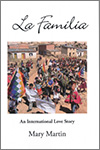Review: LA FAMILIA by Mary Martin (Bolivia)
 La Familia: An International Love Story
La Familia: An International Love Story
by Mary Martin (Bolivia 1976-78)
Book on Demand Publisher
February 2016
299 pages
$19.95
Reviewed by Bob Arias (Colombia 1964-66)
Gaining Ground was the “how to” that walked us thru the creation of the US/Bolivia NGO Mano a Mano International…the creation of Joan Swanson White, a Peace Corps Volunteer in Cochabamba, Bolivia, and Segundo Velázquez, who would later become Joan’s husband. Joan a polio victim as a child, found Peace Corps her calling. Married at the time (1976-1978) to David White, she was concerned to discover that 37% of rural children suffer from chronic malnutrition, and ten percent of rural children die before age five.
La Familia is more than a “love story,” but a trip down memory lane for the Velázquez family, especially the siblings, always working together as a unit in true Quechua fashion, Segundo, José, Ivo, and Blanca. Segundo, an active member of the family, met Joan on her first week in the village. He helped her carry a heavy container of water to her hut. They became friends during her two years in Bolivia. Joan wanted to help the children, the community, and Bolivia…one of the poorest countries in Latin America. As a Volunteer, she worked to improve nutrition, teach mothers’ basic health practices for their children, and challenge the climate and environment. With few roads, schools, no running water, and lack of health centers, Joan wanted to do something for Bolivia. Her husband David taught youth the workings of motors, one of his best students was Segundo.
Joan, now a Returned Peace Corps Volunteer, was the catalyst that helped create and establish Mano a Mano with her soul mate, Segundo Velázquez. She returned to the University of Minnesota to study for her doctorate, but continued to remember the needs of the community in Bolivia. Joan and Segundo noticed that Medical centers in Minnesota have an abundant surplus of medical equipment and medical supplies. And, anyone traveling to Bolivia had to take a suitcase or two of “surplus” items for the community. That is how Mano a Mano got its start! Medical facilities needed a legal NGO to donate their surplus items to. Ind in Minnesota, Hospitals keep their medical supplies current, even if the surplus items are current, once a box of container is open, the balance is discarded. In walks Segundo with his suitcases for Bolivia. Everyone benefits. f it is a “Love Story,” it is the love and respect that Joan, and the Velázquez family share. The Velázquez family is a traditional Quechua family, with Spanish their second language among Andean customs. There are eight adult children of Epifanio and Inès Velázquez, plus their adopted Joan. But it is also the work and commitment of the Volunteers both in Minnesota and Bolivia that is shared. Where few roads, no schools or medical clinics, life was a challenge to the people of the Cochabamba Valley of Bolivia.
Joan and David were divorced shortly after they returned from Bolivia, each going their own way. However, Segundo had returned with them to study and learn mechanics. He remained to assist Joan whenever possible, with the friendship growing. In Minnesota, Segundo was hired as a mechanic by Northwest Airlines, even obtaining a pilot’s license. Joan and Segundo were married in Minnesota on February 4, 1978…to use his Northwest Airline passes for married couples.
They became a Team, infecting everyone with a spirit of “ganas” to make a difference in their lives and the community. They would point and say…”tiene ganas!” They have the Will to do it!
Mano a Mano donated medical supplies and equipment brought from Minnesota, but roads were needed, schools demanded for youth, emergency air transportation, and even building dams for water needed for irrigation. Mano a Mano never lost sight of their goal, to provide a better life for the communities in the Andes, especially the children. Twenty plus years later they are closer to their goal. But the interesting part is that the ideas and dreams come from the people, many times only in Quechua. The work is not what Mano a Mano wants, but what the communities ask for based on their needs. Real Community Development concepts! Joan’s Peace Corps experience is visible.
Near the end of this splendid book, a new Mano a Mano staff person is hired, Dana Dallavalle. Dana is a Former Peace Corps Volunteer, having served in El Rincon, Panamá…we served together!
If you read and learned from Gaining Ground, you must pick up a copy of La Familia, a true Love story of Communities working together to make a difference in their lives!
Bob Arias (Colombia 1964-66), followed his tour by becoming Language Director for Camp Radley (1966-68), and then APCD (Colombia 1968-73), and Peace Corps CD in Uruguay and Argentina (1993-95). In 2001 he turned to create the Peace Corps Office of Safety and Security. Retiring from Los Angeles County where he was a Compliance Officer, Bob has served as a Peace Corps Response Volunteer since 2009 in Paraguay, Colombia, and now for a second time, in Panamá.
Bob Arias writes a good review conducted the way a story is described enough to suggest to me that the book’s own story is being conducted by Mary Martin as an ode (to joy). Kudos all around. Mano a Mano.
Nice review. Why is this book not in ebook format?
Great book, great review! We should send a copy to Molly Geidel of Peace Corps Fantasties fame….maybe she could give her students a more balanced view of Peace Corps.